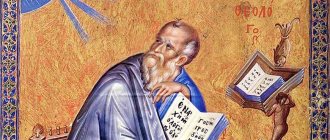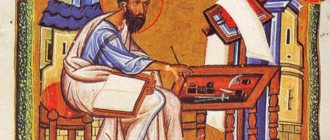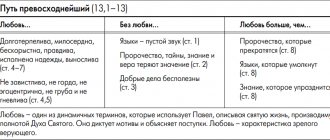Founding of the Church of Ephesus
Ephesus was a coastal city of Asia Minor on the Caistra River. It was famous as a center of trade, arts and learning and was the main city - the metropolis of the proconsular province of Asia. It was also known as a major center of paganism. It housed the anciently famous temple of Artemis (or Diana) of Ephesus, and the city itself was considered dedicated to this goddess. Here was also the seat of pagan magic, emanating from the mysteries of Artemis: mysterious and incomprehensible words written on scraps of parchment were worn as amulets, as well as images of the goddess and her temple, which was a profitable trade for many. There were also many Jews living in Ephesus who had their own synagogue here. The founder of the Church of Ephesus was St. the Apostle Paul, who, as can be seen from the 18th chapter of the book of Acts of St. apostles (vv. 19-21), first visited Ephesus around 54 AD upon his return to Jerusalem from his second evangelistic journey. Rushing from Corinth to Jerusalem for the feast, St. The Apostle Paul stayed only briefly in Ephesus, but still entered the synagogue and reasoned with the Jews: when they asked him to stay with them longer, he did not agree, but took leave of them, saying: I must certainly spend the upcoming holiday in Jerusalem; I will return to you again, if God wills. And he left Ephesus (Aquila and Priscilla, who accompanied the apostle from Corinth, remained in Ephesus) (Acts 18:19-21). This is how the first announcement of Ephesus took place with Christian preaching from the lips of St. the Apostle Paul and his colleagues Aquila and Priscilla. Apparently this announcement was a success, since the apostle was asked to stay there longer. Apollos, a learned Jew from Alexandria, who initially knew only John’s baptism, but was then instructed in detail in the teachings of the Lord by Aquila and Priscilla, as also described in the book of Acts (18:24-28), soon came to the aid of Aquila and Priscilla who remained in Ephesus. Judging by the testimony of the book of Acts, Apollos, as “an eloquent man and knowledgeable in the Scriptures,” contributed greatly to the establishment of Christianity in Ephesus. But soon he had to go to Achaia, and he sailed to Corinth, without waiting for the return of St. Pavel. The main preaching activity of St. The Apostle Paul in Ephesus occurred on his third evangelistic journey - and the story about this constitutes the exclusive content of the 19th chapter of the book of Acts. After the removal of Apollos from Ephesus and during his stay in Corinth, the Writer says, St. The Apostle Paul, having visited Jerusalem and Antioch and passed through Phrygia and Galatia - the “upper countries” - arrived, according to his promise, in Ephesus. There he found about 12 disciples who, like Apollos, knew and accepted only the baptism of John. St. Paul completed their confirmation in the faith, convinced them to be baptized with Christian baptism, and through the laying on of hands taught them the Holy Spirit (19:1-7). Following this, St. Paul began the announcement of Ephesus with the gospel sermon. First of all, according to his custom, he turned to the Jews and began to preach regularly in the synagogue. His preaching continued for three months, but “as some became hardened and did not believe, slandering the way of the Lord before the people, he, leaving them, separated the disciples and preached daily in the school of a certain Tyrannus,” perhaps some sophist, or a folk teacher, such as there were many then in the Greek cities (Acts 19:8-9). “This continued until two years, so that all the inhabitants of Asia heard the preaching of the Lord Jesus, both Jews and Greeks” (v. 10). Sermon of St. Paul was accompanied and reinforced by many amazing signs and wonders (19:11-20). St. taught this way for two years. Paul, and the Church of God took deep roots here. Unfortunately, the rebellion raised against the apostle by Demetrius the silversmith forced him to leave Ephesus earlier than he expected (Acts 19:21-40; 20:1). After the end of the rebellion, St. Paul went to visit the Macedonian churches, stayed three months in Hellas, and then decided to go to Syria again through Macedonia. The path to Syria lay through Ephesus, but since St. Paul wanted to be in time for the Feast of Pentecost in Jerusalem, then he, fearing to be detained in Ephesus, passed by him on the ship. The ship stopped at Miletus, a little south of Ephesus, and St. the apostle invited here from Ephesus and, probably, from other places “elders of the Church” to give them the last instructions and say goodbye to them. This farewell was extremely touching. “You know,” the apostle told them, “how from the first day on which I came to Asia, I taught you publicly and from house to house, and did not miss anything useful, and did not fail to proclaim to you the whole will of God - repentance before God and faith in Lord, our Jesus Christ. Now, at the pull of the Spirit, I am going to Jerusalem, not knowing what will happen to me there; only in all the cities the Holy Spirit testifies that bonds and sorrows await me there. But I do not value my life so long as I can properly fulfill the ministry that I received from the Lord Jesus Christ - preaching the Gospel of the grace of God. You will no longer see my face. Pay attention to yourself and to the whole flock, in which the Holy Spirit has appointed you as bishops to shepherd the Church of the Lord and God, which He acquired with His Blood. After me, wolves will come in among you, not sparing the flock, and from among you will arise vain people who will distract you from the truth. Watch, remembering that for three years I taught each of you day and night with tears” (Acts 20:18-31). After prayer, they wept and escorted the apostle to the ship and said goodbye to him (Acts 20:36-38). Thus ended the personal relations of St. Paul with the Ephesians, but his concerns about them did not end, as his letter testifies to this. Subsequently, the episcopal see in Ephesus was occupied until his death by the most devoted disciple of St. Apostle Paul St. Timofey. Then the beloved disciple of Christ, St., stayed here, ruling the churches of Asia Minor from here. John the Theologian. In 431, the third Ecumenical Council took place in Ephesus.
The Reason for Writing Ephesians
The message does not show any special reason for writing it. As can be seen from many places in the epistle, it was written by St. Paul in chains (3:1; 4:1, etc.). Judging by the enthusiasm and high tone of the entire letter, it can be considered probable that St. Paul was moved to write by his desire to communicate to the Ephesians those lofty contemplations into which he was led by the Spirit of God in his captivity (Bishop Theophan). Another reason could be the apostle’s desire to console the Ephesians who were grieving over the disasters that befell their spiritual father and teacher (Eph. 3:13). And, finally, the third reason could be fear for the Ephesians and a desire to warn them from the Judaizers and other false teachers. From Eph. 3:3-4 it is clear that the apostle wanted to reveal to the Ephesians the “mystery of salvation” announced to him through revelation, that the pagans, along with the Jews, are called into the Kingdom of Heaven (3:6-9).
Place and time of writing the letter to the Ephesians
Regarding the place, and therefore the time, of writing the Epistle to the Ephesians, not all interpreters completely agree with each other. What is absolutely certain is that this letter was written by St. the Apostle Paul from bonds, for in his epistle he more than once calls himself “a prisoner of Jesus Christ” (3:1), “a prisoner in the Lord” (4:1), and says that he is fulfilling an embassy in bonds (6:20). It is known that St. Paul was in prison in Caesarea Palestine, where he was in the custody of the ruler Felix for two years, until he demanded the judgment of Caesar, as a result of which he was sent to Rome (Acts 23:35; 24:27; 25:10-11), and then in Rome (Acts 28:16). In Rome, a distinction is usually made between the first bond and the second bond, between which it is believed that there was a certain interval. The ancient signatures on the letter to the Ephesians refer it to Roman bonds, but since it contains St. the apostle does not say anything about his approaching death, as he does, for example, in a later letter to Timothy, undoubtedly written from Rome (2 Tim. 4:6), but still hopes to boldly preach the mysteries of the gospel (Eph. 6:19-20), then these could only be the first bonds. Ep. Theophan the Recluse believes that the Epistle to the Ephesians was written from Caesarea in Palestine, on the grounds that: 1) in the epistle there is no indication of any changes in the Church of Ephesus for good or bad, from which it must be assumed that it was written very soon after how St. Paul left Ephesus; 2) St. the apostle asks the Ephesians to pray that the word would be given to him, with his lips openly, with boldness, to proclaim the mystery of the gospel: this goes more towards Caesarea captivity than to Rome, for in Rome the apostle enjoyed great freedom, could receive everyone and preach “with all boldness” not forbidden,” while in Caesarea he was imprisoned and only a few were allowed to enter to him (Acts 28:30-31 and Acts 24:23); 3) ep. Theophan believes that such an active apostle as St. Paul could not sit idle in Caesarea for two years, and therefore he probably wrote to his converts to Christianity, teaching and instructing them in the faith. If we accept these arguments of Bishop. Theophanes, the epistle to the Ephesians was written in Caesarea in 60 or 61 A.D. Other interpreters, comparing the epistle to the Ephesians with other epistles and finding that it was written at the same time as the epistles to the Colossians and Philemon and soon after the writing of the epistle Philippians (compare Eph. 6:21 and Col. 4:7-8), believe that the letter to the Ephesians was written from Rome in 62 or 63. This letter, like the letter to the Colossians, St. The Apostle Paul sent with Tychicus, who was instructed to inform these churches in detail about their circumstances.
Authenticity of the message
Tertullian, in his polemic against Marcion, says that the Marcionites considered the letter to the Ephesians to be written not to the Ephesian, but to the Laodicean church. In some ancient copies the words "En Epheso" - "To the Ephesians" - are actually printed, in others they are only in the margins. At the same time, in the letter to the Colossians, which, due to the similarity of content and indication of the time of departure, belongs to the same time as the letter to the Ephesians (cf. Eph. 6:21 and Col. 4:7), the apostle speaks of the letter to Laodicean church, but we do not have such a message. Finally, in the letter to the Ephesians there are no such ordinary greetings of a personal nature, which would be natural, since St. Paul lived in Ephesus for three whole years. All this gives rise to new critics to reject the authenticity of the message. However, still St. Ignatius the God-Bearer, who himself wrote the letter to the Ephesians, testifies to the existence of the same letter to St. Apostle Paul. All perplexities can be easily explained if we assume that the letter to the Ephesians was in the proper sense a circular letter, intended not only for the Ephesian church, but also for all the churches of Asia Minor, including Laodicea, in relation to which the Ephesian church could be considered a metropolitanate. The authenticity of the letter to the Ephesians is then confirmed by St. Polycarp of Smyrna, St. Irenaeus of Lyons and Clement of Alexandria, who literally quote some expressions from it.
About the church in the city of Ephesus
The city of Ephesus was located in Asia Minor near modern Izmir (ancient Smyrna). This city was called “the city of the goddess Artemis.” The Temple of Artemis is one of the Seven Wonders of the Ancient World. In 2015, this ancient city of Ephesus was included in the UNESCO World Heritage List. It was this city that the Apostle Paul visited. This city has a port. It is located off the coast of the Aegean Sea. During his third missionary trip, the Apostle Paul organized a church there and had a special, personal relationship with this church. Paul spent almost two years in this church, teaching and discipling believers on a solid foundation of Bible doctrine in a pagan city. Ephesians was probably written around the same time as Colossians and Phillemon. Perhaps it was delivered by the same messengers. George Armitage commented on this epistle as "the crowning achievement of all Paul's writings." Arthur Pierson said it was "Paul's Third Heavenly Epistle." Murejeda noticed the peculiarity of silence and sanctuary in this message. In his words, “we enter into the peace and quiet of the sanctuary... There is an atmosphere of quiet contemplation, worship and peace.” Let's look into the depths of this wonderful message together.
Contents and Division of Ephesians
The book of Ephesians contains six chapters. The main subject of the epistle, as its author himself says (Eph. 3:2-9), is the mystery of God’s economy, and then the moral demands arising from it. Accordingly, the message naturally falls into two equal parts: 1) Dogmatic, which occupies the first three chapters (1-3); 2) Moral, which embraces the other three chapters (4-6). The dogmatic part is an abbreviated presentation of the main Christian truths, but primarily develops the idea of the Church as the Body of Christ; the moral part teaches unity of faith and unanimity in moral activity, equipping us for spiritual warfare. In general, this message is extremely important, representing an excellent apology for Christianity. St. Chrysostom and Blessed. Jerome emphasized the mysterious depth of this letter, and St. Athanasius called it a catechism of Christian teaching. Many of the interpreters see in it a kind of program for the entire apostolic preaching.
Summary
The main events described in the letter are: the glory and headship of Jesus Christ, prayer that Christians can realize God's purpose and power, steps to achieve God's purpose, salvation by grace, reconciliation of Jews and Gentiles through the cross of Christ, revelation of God's wisdom through Church, prayer for a deeper experience of the fullness of God, practical ways to fulfill God's purpose in the Church.
Paul emphasizes in Ephesians that we are saved by grace through faith alone, not from our works, and not only for our own good, but also to bring glory and praise to God. God's purpose was to bring everything in the world under the authority of Jesus Christ “in the dispensation of the fulness of times, that all things in heaven and on earth might be united under the head of Christ” (1:10). It is important for a Christian to understand this (1:15-23), so Paul prays for this understanding several times. Paul prays a second time for this understanding in 3:14-23. The unity of the Church under the headship of Christ predicts the unity of “all things in heaven and on earth.”
The Apostle Paul covers the following topics:
- The Position of Believers in Union with God (Chapters 1-3)
- The State of Believers in Unity with One Another (Chapters 4-5)
- The position of believers in unity against the evil one (Chapter 6).
Exegetical Analysis of the Epistle to the Ephesians
The letter to the Ephesians begins with the usual inscription and apostolic greeting: “Paul, an ambassador of Jesus Christ by the will of God, to the saints and believers in Christ Jesus who are at Ephesus: Grace to you and peace from God our Father and the Lord Jesus Christ” (vv. 1-2) . The dogmatic part of the message begins with verse 3. The Holy Apostle first of all gives praise and thanksgiving to the God and Father of our Lord Jesus Christ for our election to a holy life, which was predestined “before the foundation of the world” and consists in our adoption to God through Jesus Christ, who, having accomplished salvation through His Blood and revealed the secret of God's favor to people, he became the Head of everything in heaven and earth and made us through Himself heirs of God (vv. 3-12). Then the apostle turns his spiritual gaze to the Ephesians, who believed in Christ and, therefore, became participants in the blessings given to them, and thanks God for them, remembering them in his prayers and asking God to give them the Spirit of wisdom and enlighten the eyes of their hearts that they might know the riches of His inheritance and the power of His power (vv. 13-19). Verses 20-23 contain an important teaching about the exaltation of the Risen Christ as the God-man above all creation and the subjection of all existing things to Him. Here we see the exaltation of human nature in the person of our Savior, evidence that the Lord Jesus Christ, even as a Man, is the King and Lord of heaven and earth, of Angels and men. “He set Him above all things, as the head of the Church, which is His Body, the fullness of Him that fills all in all” (vv. 22-23). This teaching about the Lord Jesus Christ as the Head of the Church is extremely important. Just as the members of our body form one living organism with their heads, so all believers with Christ also form one bodily-spiritual organism. Those who are baptized into Christ put on Him and become one with Him. Therefore, Christ acts in Christians as a creative and life-giving force (Bishop Theophan). The entire life of the body—organic and mechanical—depends on the head. And psychologically, the head, as the seat of the brain, the main organ of mental activity and external feelings, is recognized as the source of spiritual life, its guiding principle. This comparison of the apostle gives the idea of the complete dependence of the Church on the Lord Jesus Christ, that Christ Himself leads His Church. “The fullness of Him who fills everything in everything”—these words are somewhat obscure and give different thoughts. It is most correct to understand these words this way: the Church is a spiritual organism in which there is no place where the Divine powers of Christ do not operate. “She is full of Christ. He fills it all” (Bishop Theophan). St. Chrysostom explains why the Apostle did not limit himself to calling the Church only the Body of Christ, and Christ its Head: “so that you, having heard the word “head,” do not take it in the meaning of only power, but in its own sense, consider Him only the boss, but saw in Him the actual Head, the apostle adds: the fullness (that is, the Church is the fullness) of Him who fulfills all in all. The Apostle considers the title of “chapter” to be insufficient to show the kinship and closeness of the Church to Christ.” In the second chapter, the apostle talks about how the greatness of the actions of God’s economy was reflected in the revival, as if resurrection from the dead, of spiritually dead people, exalted by God out of extreme humiliation. This was accomplished solely by the grace of God, without any merit on the part of man himself: “by grace you have been saved through faith, and this is not from you, it is the gift of God: not by works, so that no one can boast” - sectarians are very fond of these words, trying to prove with their help, their false teaching about the uselessness of good works for salvation. But it is clear that here we are talking about only the first moment, about God’s very arrangement of salvation, and not about the assimilation of this salvation by people. About the latter it is said: “we are His workmanship, created in Christ Jesus to do good works, which God prepared in advance for us to walk in.” The meaning of all these words is that “salvation has been prepared for us and we are called to receive it not for any works, but by grace alone. But they are called not to do nothing on their part, but to work out their own salvation, being rich in good deeds” (Bishop Theophan) (vv. 1-10). Further, the apostle speaks of the great goodness of God, which arranged so that the pagans and Jews, hitherto alien to each other, were united into one Body “by the Blood of Christ.” The Lord, as it were, re-created humanity (vv. 11-15), reconciling both Jews and pagans with God through the cross, killing the enmity on it, that is, enmity with God, which alienated both peoples from Him due to their sinfulness. And here St. Paul emphasizes the abolition of the Old Testament law in the New Testament with the words: “having abolished the law of the commandments by doctrine” (v. 15) and “put an end to the law, which, like some kind of wall, separated Jews and Gentiles.” “And he came and preached peace to you who were far and near” (v. 17) - the essence of the gospel of Christ was that the Son of God, who became incarnate and suffered for us on the cross, reconciled us to God. The apostle here calls the pagans “distant” and the Jews “near” (Blessed Theodoret). United among themselves in Christianity, Jews and pagans formed one Church, as if one building, established on the foundation of the apostles and prophets and on the Cornerstone - the Lord Jesus Christ Himself, and are held together by one Spirit (vv. 17-22). It is important here that Christ is the Cornerstone on Whom the Church was created, and not the Apostle Peter, as the Latin Roman Catholics claim. In the third chapter, the apostle speaks about the hiddenness of the mystery of the calling of the pagans to the Church of Christ and that he was given the grace to proclaim this mystery of Christ to the pagans. He suffers many sorrows from the Judaizers for this sermon, but does not lose heart and asks the Ephesians not to grieve for him (vv. 1-13). Finishes St. the apostle the dogmatic part of the letter with a prayer for the Ephesians (vv. 14-21), so that they would be confirmed in faith and love for Christ and would understand “the love of Christ that surpasses knowledge, in order to be filled with all the fullness of God,” that is, with every virtue with which God is filled, “yes.” You will have Him completely dwelt in you,” according to the explanation of the saint. Theodorit. Having wished the Ephesians to achieve the fullness of Christian perfection, St. the apostle gives glory to God in the Church in Christ Jesus (vv. 20-21). The second half of the letter to the Ephesians, encompassing the last three chapters - 4, 5 and 6, represents the moralizing part of the letter. Having explained in the first three chapters that all Christians constitute one Body with One Head, Christ, St. The apostle deduces from this main thought of the letter how Christians, united and renewed in Christ, should live and act. First, he depicts: 1) the general order of life, the main feature of which is unanimity in faith (4:1-16); then - 2) the rules of life, common to Christians of all states (4:17; 5:21); 3) rules of life are specific, by state, listing the mutual responsibilities of spouses, children and parents, slaves and masters (5:22; 6:9), and, finally, 4) calls in general to the fight against the world and sin, drawing an image of Christian asceticism (6:10-18). In the fourth chapter of St. The apostle exhorts the Ephesians to act worthy of the calling to which they are called, that is, the Christian calling. This should be based on humility, meekness, long-suffering and love. The main thing that Christians should strive for is “unity of the spirit in the bond of peace.” As the strongest motivation for such spiritual unity, St. The apostle exposes that Christians have “one Lord, one faith, one baptism, one God and Father of all, who is above all, and through all, and in us all” (vv. 1-6). Each of the believers, as an individual member in the body, is given a special grace, a special gift, with which he must serve others for the common benefit. This diversity of gifts not only does not interfere with unanimity, but, on the contrary, further strengthens the unity between Christians, just as the diversity of members does not prevent the body from growing and strengthening through their mutual assistance. For this peaceful and loving creation and growth of the Body of His Church, “for the equipping of the saints, for the work of ministry, for the building up of the Body of Christ” (v. 12), Christ appointed “some apostles, others prophets, some evangelists, others shepherds and teachers” (v. . eleven). Here the divine establishment of the church hierarchy is clearly affirmed in denunciation of Protestants and sectarians who deny the legal hierarchy. The purpose of the establishment of the church hierarchy is to help the spiritual perfection of believers: “until we all come into the unity of the faith and the knowledge of the Son of God, into a perfect man, to the measure of the full stature of Christ” (v. 13), that is, until “we all ascend to the state of perfection.” rest in God and, imagining a dwelling worthy of God, will have Him dwelling within them. This is the measure of the age of Christ’s fulfillment” (Bishop Theophan). The main task of moral Christian life is not to be infants, tossed about and carried away by every wind of doctrine, but, following the example of a living organism, uniting with each other in love, to grow the Body of Christ’s Church “into Him Who is the Head, Christ” (vv. 7-16). In the second half of this chapter, St. The apostle, depicting the negative aspects of the life of the pagans, as the Ephesians formerly were, exhorts to “put off your former way of life, the old man, which is corrupted by the deceitful lusts” and “put on the new man, created according to God in true righteousness and holiness.” This inner renewal must be expressed first of all in truthfulness: “having rejected lies, speak the truth every one to his neighbor” (v. 25); then - in absence of anger: “if you are angry, do not sin; let not the sun go down on your anger” (v. 26), that is, make peace with the one with whom you are angry, even before sunset; further the apostle exhorts not to steal, but to work with one’s own hands, “so that there may be something to give to the needy”; avoid rotten words, that is, foul language, and be modest and edifying in conversations, do not offend the Holy Spirit with your bad behavior, avoid all strife, irritation, rage, anger, shouting and slander, but be kind, compassionate and mutual to each other forgive offenses, “just as God in Christ forgave us” (vv. 17-32). Continuing the same moral instructions in the fifth chapter, St. the apostle urges Christians to imitate God in love, just as children imitate their father, taking his example in everything (vv. 1-2). As an incentive to moral life, St. The apostle indicates the deprivation of sinners of the Kingdom of God, warning especially against fornication and drunkenness and against all uncleanness and covetousness, and exhorting Christians: “Walk as children of light,” testing what is pleasing to God. The state of an inveterate sinner is like a deep sleep, but he can also wake up from this sinful sleep, and the apostle cries out: “Arise, you who sleep, and rise from the dead, and Christ will sanctify you” (v. 14). Some interpreters believe that these words represent a free transfer of what was said by St. the prophet Isaiah in 60:1 and 26:9 and verse 19: “Arise, shine (Jerusalem), for your light has come, and the glory of the Lord has risen upon you.” Teaching further that this temporary life is given to us to prepare for eternity, and bearing in mind the many sinful temptations that surround us in this life, St. The apostle exhorts: “walk carefully, not as fools, but as wise, making value of time, because the days are evil” (vv. 15-16), that is, do not waste precious time and use it to prepare yourself for eternity. To do this, first of all, you should not be “unwise,” but “know what the will of God is.” The apostle especially warns against the abuse of wine, saying that such abuse leads a person to debauchery. Instead of carnal pleasures, Christians must seek spiritual pleasures, being filled with the Spirit and edifying themselves by singing psalms and spiritual songs, and it requires that these songs be sung not only with the tongue, but also with the heart (vv. 1-20). The second half of the fifth chapter is devoted to instructions on the duties of married life. Here the apostle presents the marital union as an image of the mysterious union of the Lord Jesus Christ with the Church, which is why these verses 20-33 constitute the content of the apostolic reading when celebrating the sacrament of marriage. From husbands the apostle demands selfless love for their wives, and for wives he prescribes complete obedience to their husbands: “wives, submit to your husbands as to the Lord” (v. 22) - since the apostle further explains that “the husband is the head of the wife, just as Christ is the head Church” (v. 23), then “just as the Church submits to Christ, so do wives to their husbands in everything” (v. 24), that is, in everything good. From this it is clearly clear that the obedience commanded to wives is not slavish and forced, but “as to the Lord,” that is, sincere and heartfelt, based on love. The headship of the husband in a Christian marriage should be understood only as primacy, which is always inevitable in all unions and societies consisting of several persons, but not as authority. The husband is the natural head of the family because he bears the main burden of family responsibilities, which the wife cannot bear given the relative tenderness of her nature and the weakness of her physical strength. “Husbands, love your wives, just as Christ loved the Church and gave Himself for her” - therefore, marital love must be, first of all, spiritual love, and not carnal, and have a moral goal: “to sanctify her, cleansing her with the washing of water... so that she was holy and blameless” (vv. 25-27) - here by “bath of water” we mean the sacrament of baptism, by which Christ cleanses those who enter His Church from all filth and impurity. In the same way, husbands should take care of the moral purity and salvation of the souls of their wives. At the same time, husbands must express their love by caring for their wife as if they were their own body—to “nourish and warm” her, “just as the Lord does the Church” (vv. 28-30). This again points to the need in Christianity for spiritual love between spouses: the husband should look at his wife not as some kind of mechanical instrument for carnal pleasures, but as a part of himself. In this regard, the apostle also recalls the biblical basis for such love for a wife: “a man will leave his father and his mother and cleave to his wife; and they will become one flesh” (Gen. 2:24). With these words, the apostle wants to incline Christian spouses to a strong marital union and show how unnatural and ungodly marital disagreements, and even more so divorces, are. “This mystery is great; I speak in relation to Christ and to the Church” (v. 32) - these words are best explained by St. Chrysostom: “Truly this is a mystery that a person, leaving the one who gave birth to him, who gave birth to him, who raised him, and the one who conceived him, was sick with him, gave birth in illness, leaving those who did so much good, to whom he was accustomed, is combined with the one to whom I have never seen before, which has nothing in common with him, and prefers her to everything... Truly this is a great sacrament, containing some kind of hidden wisdom.” “I speak in relation to Christ and to the Church” - with this addition of St. The apostle wants to convey that the closeness of a husband to his wife and their mutual unity in a blessed Christian marriage are so great and contain such a mystery that they can be the best and most visible likeness of the mysterious unity of Christ with the Church, in which they have their highest prototype. “There is a lot of mystery in a natural marriage between husband and wife,” as the apostle says, “but I am talking about a Christian marriage, concluded in the image of the union of Christ with the Church. Such a marriage is already the greatest mystery, it is already a church sacrament.” What is the union of Christ with the Church? It is a very close union, imbued with love, holy and indissoluble. This is also how marital unity in a Christian marriage should be. In conclusion, the apostle says: “Let each of you love his wife as himself; and let the wife be afraid of (her) husband” - everything should be mutual among the spouses. At the beginning, the apostle said: “submit to one another in the fear of God,” but nevertheless, the husband is the head, and therefore the wife owes him special obedience. Since wives tend to be burdened by the power of their husbands over them, and husbands tend to abuse their superior position, the apostle, in conclusion, commands what can primarily be violated in marriage: love commands husbands, and obedience to wives. The expression: “let the wife fear her husband” is, of course, only a figurative expression, and does not at all mean the wife’s slavish fear of her husband, who has no and cannot have a place in Christianity. This “fear” is nothing more than respect for your husband with fear of offending him and reducing his love for himself. Blzh. Jerome translates this expression: “let the wife honor her husband.” In the sixth chapter of St. The apostle speaks first of all about the responsibilities of children to their parents, and then of parents to their children. Children must obey their parents, for the natural law of justice requires this and the fifth commandment of the Law of God commands this, and parents should not be overly harsh with their children, should not lead them into sin, but should raise them wisely in the teaching and discipline of the Lord (v. 1-4). Further, the apostle instills in slaves obedience to their masters, and in masters a fair and lenient attitude towards their slaves. The political or social question of the legality or illegality of slavery by St. The apostle is not concerned here at all. The Christian Church did not at all set itself the task of producing external political or social coups, but only the internal revival of people, which, of course, should also lead external changes in all human life (Article 5-9). In conclusion of moral instructions of St. The apostle calls on Christians to the invisible spiritual battle with the enemy of our salvation - the devil and his servants: here we see the foundation of Christian asceticism. The whole life of a Christian should be a constant struggle. The apostle calls on Christians for this struggle to fall asleep into the whole armed of God, to teach the loins with the truth, to put on the armor of righteousness, to put their feet in the willingness of the gospel of the world, and mainly - take the shield of faith, the helmet of salvation and the spiritual sword - the word of God and, armed so, to conduct a stubborn struggle Against the intrigues of the devilish, against the spirits of the anger of the Middle Kingdom, constantly attracting a person on the path of sin and opposing the will of God. This apostolic reading (Article 10-17) is read during the memory of some reverend and when tonsured in monasticism. In this case, the main weapon should be prayer, and, moreover, the constant - "at all time." Evil perfumes are called “world -holders” here not in the sense that they are given power over the world, but because everything is evil in the world, all evil people do their will: they are world -holders of the world, “in the evil of the lying”. The expression “Celestials” means that the perfumes of evil hug us everywhere, hug us from everywhere, as the air surrounds us everywhere, and they constantly grow up to us, “like mosquitoes in a raw place”, in figurative comparison of the EP. Theophan the Recluse. The “all -armed of God” is especially necessary for us, so that we can resist these evil spirits “evil day”. By this “evil day” we must understand especially decisive minutes in our life, what is death and the Last Judgment, when we need to give a report to God about our earthly life, as we conducted it. From all this, it is clear that Christians are the warriors of Christ who are obliged to conduct a constant struggle with the enemy of God and the enemy of human salvation by the devil and with his servants and all kinds of evil from them. A Christian should be completely irreconcilable for all kinds of devilish evil, but, of course, to fight with him by a Christian with means (Article 10-18). In the conclusion of the message, which contains 19-24 verses, St. The apostle asks, firstly, prayers for himself, teaching that the prayers of the Church are more important and above all persons that are set in it, and secondly, speaks of the embassy to the Ephesians of Tikhik, so that he would announce to them about the circumstances and deeds and deeds and deeds and deeds and deeds and deeds Thus consoled their hearts. Ends his message St. The apostle Pavel with the wishes of the brethren of peace and love and the teaching of the usual apostolic blessing: “Grace with all the invariably loving the Lord Jesus Christ. Amen". "Consistently" means, according to the interpretation of St. Chrysostom, in sinlessness.
How to be blessed in life in Christ in practice?
Ephesians is one of the most powerful doctrinal epistles. It was probably written for the purpose of distributing it among other churches that had been infiltrated by false teachings and false teachers. For example, in Colossae. Paul reveals to us the power of God to save the believer through Jesus Christ. The believer's goal is to glorify God. Paul encourages believers to “be holy and blameless before Him in love,” to be always ready to stand in spiritual battle. This message inspires, challenges, strengthens and teaches believers about God's plan for the Church. Reading this message, it is immediately obvious that the Holy Spirit is at work in every believer to save, sanctify, glorify and honor God. This message has also transformed and strengthened my personal life. Several years ago, I returned from the hospital where my loving husband’s heart stopped beating. I needed to write a message to family and friends about how he had already met the Lord and about my great loss. For the first time, I encountered a problem that was not known to me before. It would seem to be a very simple and easy matter, but at that moment it was a test of my faith. All I had to do was sign my name at the end of the letter for the first time, without indicating the name of my spouse, as had been the case for many many years in a row and seemed to be a habit. I cried for a long time over this letter. In such despair, the Holy Spirit touched and consoled me: “You are not alone. Jesus is with you. He will not leave you nor forsake you.” I immediately came to my senses and signed: “In His grace, Tatyana.” And then she added these amazing lines: “And to him who, by the power that works in us, is able to do exceeding abundantly above all that we ask or think, to him be glory in the church in Christ Jesus to all generations, from age to age” (Eph. 3:20-21). Since then, this signature and living words of hope have been for me the consolation and hope that accompanies me on my earthly path. I don't feel deprived, abandoned or alone. His amazing grace, His power and glory are with me constantly. I had to meet lonely and suffering women and I could also console them. The whole message is a heavenly highlight. It can change your life too. How can one be blessed in practice?
- The greatest blessing is revealed in Christ Jesus. Bless God for every blessing, even if trials come. Trials bring us closer to God. “Blessed be the God and Father of our Lord Jesus Christ, who has blessed us with every spiritual blessing in the heavenly places in Christ” (1:3) .
- Salvation in Christ Jesus is the gift of God and is obtained only by the grace of God. Do not try to buy, deserve, or earn your salvation through good works. The Word of God reveals the truth to us. “For by grace you have been saved, through faith; and this not of yourselves, it is the gift of God; not by works, so that no one can boast” (2:8-9).
- Be holy and be living witnesses of God's grace. In Christ Jesus, we have unsearchable riches through the gospel. “To me, the least of all saints, was given this grace—to preach to the Gentiles the unsearchable riches of Christ and to reveal to everyone what is the dispensation of the mystery that has been hidden in God from eternity” (3:8-9).
- Be established and rooted in the love of Christ and know the fullness of God. “...rooted and established in love, they were able to comprehend with all the saints what is the breadth and length and depth and height” (3:18).
- Grow in grace and faith and live in imitation of God: “That we may no longer be children, tossed to and fro, and carried away with every wind of doctrine, by the wickedness of men, by the cunning craft of deceit” (4:14).
- Do good, be compassionate and learn to forgive: “but be kind to one another, compassionate, forgive one another, just as God in Christ forgave you.” (4:32).
- Live worthy of your calling. You are a new creation in Christ. Walk in the light of God. “You were once darkness, but now you are light in the Lord: walk as children of light” (5:8).
- Take on the full armor of God so you can stand your ground in all trials. Be constant in personal communication with the Lord. “Put on the whole armor of God, that you may be able to stand against the wiles of the devil” (6:11).
Read the Bible, meditate on the unsearchable riches in Jesus Christ!
Author of the article: Tatyana Moroz







